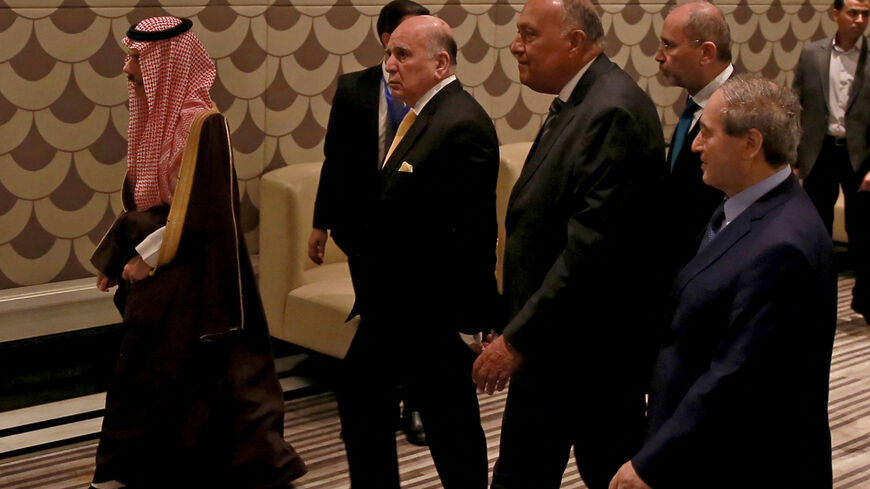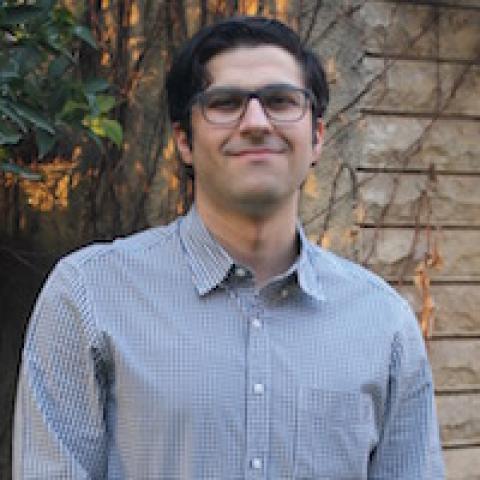Arab diplomats gathered in Jordan Monday for a meeting on Syria’s return to the Arab League. Amman has taken a leading role in advocating for Damascus' return to the organization this month ahead of its May 19 meeting in Saudi Arabia.
Saudi Foreign Minister Prince Faisal bin Farhan and his Egyptian and Iraqi counterparts Sameh Shoukry and Fuad Hussein all traveled to Amman for the meeting with Syria's Faisal al-Mekdad. Jordanian Foreign Minister Ayman Safadi met Mekdad ahead of the five-way meeting.
The United Arab Emirates was not represented at the meeting even though it was the first Arab country to embrace normalization with Syrian President Bashar al-Assad in 2018.
استقبل نائب رئيس الوزراء ووزير الخارجية وشؤون المغتربين @AymanHsafadi وزير الخارجية والمغتربين في #الجمهورية_العربية_السورية الدكتور فيصل المقداد، وذلك لدى وصوله #اجتماع_عمّان_التشاوري الذي تستضيفه #المملكة_الأردنية_الهاشمية. #الأردن#سوريا
🇸🇾 🇯🇴 pic.twitter.com/kCbx9i3fYB— وزارة الخارجية وشؤون المغتربين الأردنية (@ForeignMinistry) May 1, 2023
The gathering will focus on Syria’s return to the Arab League as well as a broad political solution to the Syria conflict, according to Reuters. Last month in Riyadh, Jordan proposed a peace plan to end the Syrian conflict and address its devastating consequences in the region. The agenda for Monday includes further discussion on refugees, water issues, border security and drug smuggling, according to Jordan's official Petra news agency.
The ministers released a statement following the meeting saying the Syria crisis "caused killing, devastation and destruction" and endorsed a solution to the conflict that would result in the "exit of all illegitimate foreign troops" from Syria. They also agreed to continue facilitating humanitarian aid to Syria and to cooperate on the "safe and voluntary" return of Syrian refugees to Syria, and named United Nations Security Council Resolution 2254 as a guide to ending the conflict, among other things, per the statement.
Background: Syria was suspended from the Arab League in 2011 in response to the government’s violent repression of the Arab Spring protests. Many countries in the region such as Saudi Arabia and Turkey severed relations with Syria and began supporting Syrian rebel groups fighting Assad.
Syria’s political rehabilitation has gained significant momentum recently. Saudi Foreign Minister Prince Faisal bin Farhan visited Syria last month following Mekdad’s surprise visit to Saudi Arabia. Jordan's king also visited Saudi Arabia last month to discuss Syria normalization with his Saudi and Emirati counterparts.
Why it matters: Jordan hosts more than a million Syrian refugees while Iraq hosts around 250,000. There is growing anti-Syrian refugee sentiment in Jordan, Lebanon and Turkey, where some people blame Syrian as well as Iraqi refugees for rising costs of living.
Drug trafficking and border security are also increasingly important issues in the region due to the multi-billion-dollar Captagon trade emanating from Syria. Saudi Arabia is a major destination for Captagon, which is also moved through Jordan. Jordanian officials have accused elements within the Syrian military of facilitating the Captagon trade.
Also on Monday, Saudi authorities said they thwarted an attempt to smuggle more than five million amphetamine pills into Jeddah. They did not say where the drugs came from.
Know more: Syria’s reintegration into the Arab fold is connected to Saudi Arabia making peace with its rivals in recent years. It remains unclear if Syria will get an invite to the May 19 summit. The Wall Street Journal reported last month that at least five members of the Arab League are refusing to readmit Damascus including Morocco, Kuwait, Egypt, Yemen and Qatar.
Iran's President Ibrahim Raisi, a strong backer of Assad, is visiting Damascus on Wednesday. In March, Saudi Arabia and Iran agreed to resume diplomatic relations following years of indirect conflict between them in Yemen and to a lesser extent in Syria.








